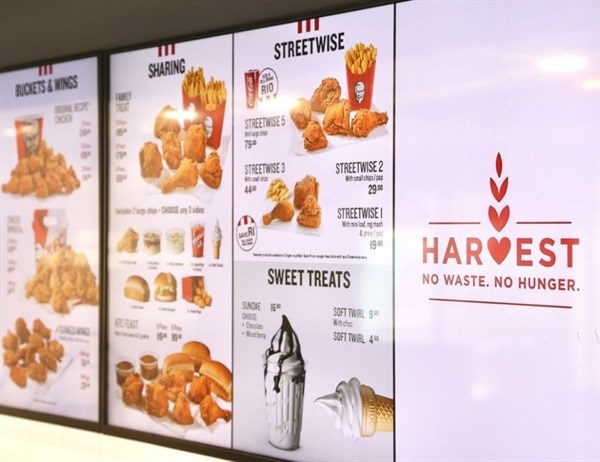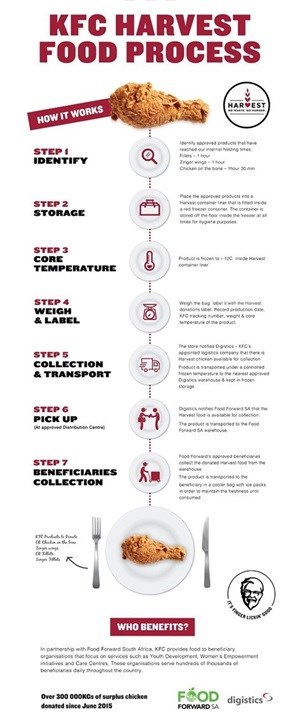KFC South Africa's Harvest initiative aims to change the way the quick service restaurant industry deals with surplus food in restaurants. This programme helps to reduce the volume of food dumped in landfills while combating climate change through the reduction of greenhouse emissions associated with food waste.
The Harvest programme sees just under 200 KFC restaurants repurposing what they do with surplus chicken and getting it to people that need it most. To date since 2015, KFC has donated approximately 326,058kgs of food, which has been converted into in excess of one million meals.
Surplus food is defined by KFC as food that is perfectly fit and safe for human consumption but is surplus in nature due to the standards and procedures that exist within its restaurants due to strict internal hold times. If cooked chicken has reached the internal holding time for sale to customers, they then remove the chicken and repurpose it into the Harvest programme.
A global problem
Food wastage is not is not specific to Africa; it's a global problem. According to a recent study by the Boston Consulting Group (BCG), currently 1.6 billion tonnes of food, worth $1.2 trillion is thrown away or lost annually and could rise by almost a third by 2030, resulting in two billion tonnes binned.
A typical “low quality” meal consists of mostly mealie-meal, bread or rice, with very little animal protein or vegetables to provide nutrients. In South Africa, around 90% of overall waste is disposed of in landfills where it leads to the production of methane gas and carbon dioxide.
Through the partnership with Food Forward South Africa, participating restaurants distribute frozen surplus chicken to Food Forward who then give it to identified non-profit beneficiaries. Frozen surplus chicken is distributed by Digistics, KFC's transport partner, to Food Forward depots on weekly pick up schedules.
Beneficiaries then collect the food and prepare meals for people in need. In addition to the surplus frozen chicken in restaurants, KFC repurposes additional food and ingredients (kidney beans, tortillas, relish and rice) as part of the donation to complete their meals.
The environmental impact of this surplus food has resulted in approximately 221 tonnes of Co2 and 9,700 tonnes of Methane (Ch4) not being produced in landfills. Both gasses have a serious impact on the environment; in air quality, soil degradation and water quality.
Championing change
“In 2015 we amended our business process to accommodate the surplus food programme which was key to ensuring the success of the programme whilst maintaining our rigorous internal food safety procedures in restaurants,” says Thabisa Mkhwanazi, public affairs director at KFC Africa. “We are so proud of the way our team members have immersed themselves in the spirit of championing the change by becoming part of the solution to reduce food waste in our business and in landfill while improving the well-being for most South Africans benefiting from this programme,” she adds.
Wayne Du Plessis from Food Forward comments: “We are excited about growing the partnership with KFC through their Harvest programme. It will allow us to increase access to edible nutritious food, including protein sources, to those who need it. KFC is a long-standing and valued partner of Food Forward SA and have made it their priority to address food insecurity at scale across South Africa.”













































